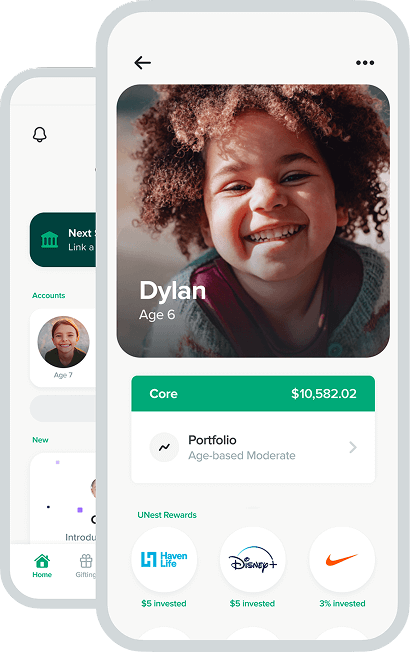Family investing made easy
Build a brighter future for your kids. Join the growing community of parents that save and invest with UNest.
Get StartedAS SEEN IN
UNest is the market leader in tax-advantaged custodial investment accounts* for kids.
* Investment advisory services offered through UNest Advisers, LLC, an SEC-registered investment adviser.
One Year Free
No fees on balances up to $300 for the first 12 months
What’s better than watching your kid’s money grow?Watching it grow for free.
after your first year or $300+ balance
$2/mo + 0.25% annual
no surprises
Rewards
Hundreds of brands are waiting to invest in your kid’s future for making purchases you would make anyway.
Gifting
Invite your friends and family to invest alongside you in your kid’s financial future.
Protection
Give your family more than just a head start — give them financial security.
Term life insurance through
4.7 star app store rating


Veteran-led Business
US Air Force and Army Veterans are a core part of the company leadership team.

Families First
Every decision starts with what is best for families and their children, not institutions or insiders.

Low Cost, High Integrity
We've created UNest to be the lowest-cost provider because every dollar saved in fees is a dollar that compounds for a child’s future.

Community-led Growth
Family, friends, and trusted brands investing together create better futures for children.
UNest Savings Calculator
Adjust the numbers to explore how your savings could add up.
From our UNest families
Join thousands of families building brighter futures for their children
.jpeg)
Setting up the accounts for my kids was fast and easy. I enjoy using the app and watching my kid’s account balance grow!

UNest makes saving for my kids straightforward. Fast to set up, automated savings, and a high-quality app.

It’s simple, trusted and streamlined. A great piggy bank that actually earns while you save for your kids.
.jpeg)
Setting up the accounts for my kids was fast and easy. I enjoy using the app and watching my kid’s account balance grow!

UNest makes saving for my kids straightforward. Fast to set up, automated savings, and a high-quality app.

It’s simple, trusted and streamlined. A great piggy bank that actually earns while you save for your kids.

Hear from our brand ambassadors
Tap a card to discover their story
For all you parents out there, do well by your children. Y'all can save! UNest!
Montell Jordan
Grammy-Nominated Artist
Watch
Tap to flip back

This is how we UNest
Montell Jordan
Tap for more
I have four kids, and their future matters. Saving and investing should not be complicated. UNest removes the friction that turns good intentions into unfinished projects. I wish this had existed earlier in my life.
Brent Celek
Superbowl Champion
Tap to flip back

UNest makes investing easy
Brent Celek
Tap for more
As a father of two young boys, I care about their financial future and I know that other parents are feeling the same way. By making it easy for parents to step into saving plans, UNest is going to transform the future of the next generation.
Baron Davis
NBA All-Star
Tap to flip back

Transforming the financial future of the next generation
Baron Davis
Tap for more

